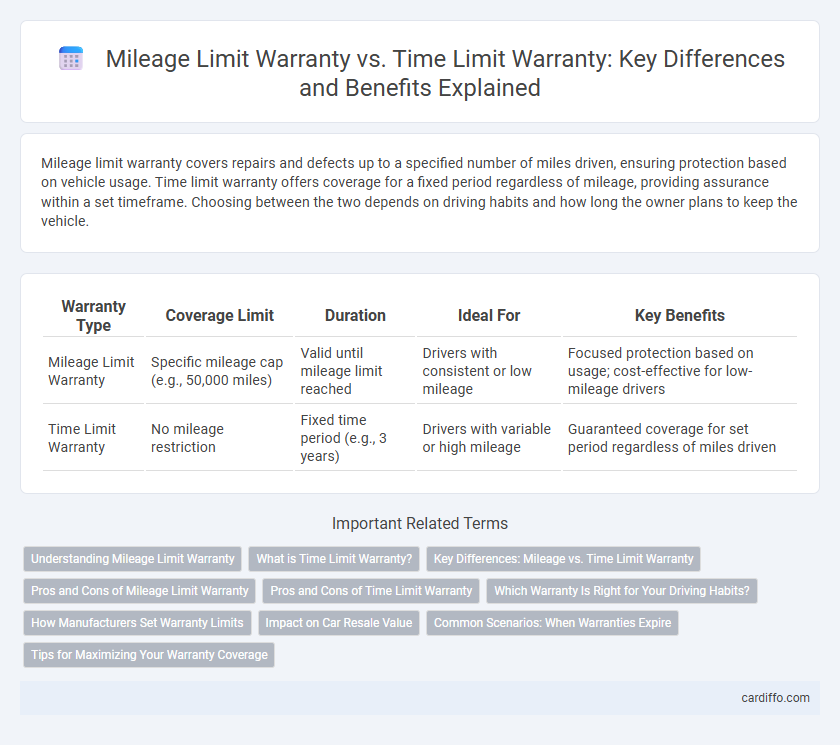Mileage limit warranty covers repairs and defects up to a specified number of miles driven, ensuring protection based on vehicle usage. Time limit warranty offers coverage for a fixed period regardless of mileage, providing assurance within a set timeframe. Choosing between the two depends on driving habits and how long the owner plans to keep the vehicle.
Table of Comparison
| Warranty Type | Coverage Limit | Duration | Ideal For | Key Benefits |
|---|---|---|---|---|
| Mileage Limit Warranty | Specific mileage cap (e.g., 50,000 miles) | Valid until mileage limit reached | Drivers with consistent or low mileage | Focused protection based on usage; cost-effective for low-mileage drivers |
| Time Limit Warranty | No mileage restriction | Fixed time period (e.g., 3 years) | Drivers with variable or high mileage | Guaranteed coverage for set period regardless of miles driven |
Understanding Mileage Limit Warranty
Mileage Limit Warranty covers vehicle repairs and defects only up to a specific number of miles driven, typically defined in the warranty contract, such as 36,000 miles or 60,000 miles. This type of warranty ensures that coverage remains valid as long as the mileage threshold is not exceeded, regardless of the time elapsed since purchase. Understanding the mileage limit is crucial for vehicle owners to avoid unexpected repair costs after surpassing the predefined mileage cap.
What is Time Limit Warranty?
Time Limit Warranty guarantees coverage for repairs or replacements within a specified period, such as three years from the purchase date, regardless of mileage driven. This type of warranty ensures protection against defects or malfunctions during the set time frame, offering peace of mind to consumers. Unlike Mileage Limit Warranty, Time Limit Warranty prioritizes duration over distance, making it ideal for drivers with varying annual mileage.
Key Differences: Mileage vs. Time Limit Warranty
Mileage Limit Warranty covers vehicle repairs or replacements up to a specified number of miles driven, ensuring protection based on usage distance. Time Limit Warranty provides coverage for a fixed duration, regardless of the miles traveled, focusing on the age of the vehicle. Key differences include mileage restrictions in the former and time restrictions in the latter, impacting warranty validity and claims.
Pros and Cons of Mileage Limit Warranty
Mileage limit warranties offer protection based on vehicle usage, typically covering repairs only up to a specified number of miles, which can be beneficial for low-mileage drivers who avoid excessive costs. However, this warranty type may leave high-mileage drivers vulnerable once the mileage cap is reached, even if the time period has not expired. Choosing a mileage limit warranty requires balancing expected driving habits against potential repair risks beyond the coverage threshold.
Pros and Cons of Time Limit Warranty
Time Limit Warranty offers clear protection for a fixed duration, providing peace of mind without the need to track mileage, which simplifies claims and enhances customer satisfaction. However, it may result in reduced coverage for infrequent drivers who use the vehicle sparingly, potentially leading to unutilized warranty benefits. This type of warranty is advantageous for owners prioritizing time-based assurance rather than distance-driven evaluation.
Which Warranty Is Right for Your Driving Habits?
Mileage limit warranties are ideal for drivers who accumulate fewer miles annually, offering protection until a set mileage cap is reached, such as 36,000 miles. Time limit warranties benefit those who drive extensively within shorter periods, providing coverage for a specified duration, like 3 years, regardless of miles driven. Choosing the right warranty depends on your average yearly mileage and driving patterns to maximize coverage and cost-efficiency.
How Manufacturers Set Warranty Limits
Manufacturers set warranty limits by analyzing average vehicle usage patterns and anticipated depreciation rates, establishing mileage limits typically between 36,000 and 60,000 miles to reflect common driving habits. Time limit warranties often range from 3 to 5 years, based on expected component lifespan and reliability data collected during product testing. These limits balance customer protection with cost management, ensuring coverage aligns with typical wear and tear without excessive financial risk to manufacturers.
Impact on Car Resale Value
Mileage limit warranties typically offer coverage based on the number of miles driven, which can positively impact car resale value by assuring buyers of remaining protection within a specific mileage range. Time limit warranties, defined by a fixed duration regardless of miles driven, may decrease resale appeal if the expiration date approaches, reducing perceived vehicle reliability. Buyers often favor cars with active mileage-based warranties as they signal continued coverage and lower potential repair costs, enhancing resale value.
Common Scenarios: When Warranties Expire
Mileage limit warranties typically expire once the vehicle surpasses a set number of miles, commonly 36,000 to 100,000 miles, whichever comes first. Time limit warranties usually end after a specified period, such as 3 to 7 years, regardless of mileage. Common scenarios include owners reaching the mileage threshold before the time limit or vice versa, which determines when warranty coverage ceases.
Tips for Maximizing Your Warranty Coverage
Maximizing your warranty coverage requires understanding the differences between Mileage Limit Warranty and Time Limit Warranty, as both have strict thresholds that can void coverage if exceeded. Regular maintenance and documenting all service visits help maintain warranty validity within mileage and time limits specified by manufacturers. Staying informed about warranty terms and promptly addressing potential issues ensures comprehensive protection throughout the entire coverage period.
Mileage Limit Warranty vs Time Limit Warranty Infographic

 cardiffo.com
cardiffo.com